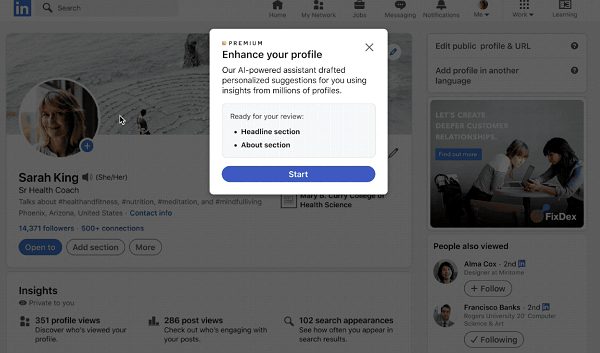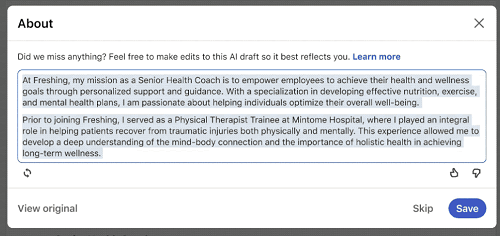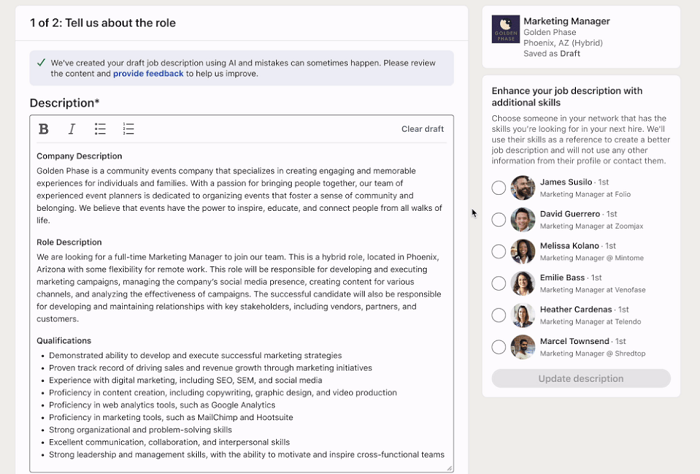As a Microsoft-owned company, it’s no surprise to see LinkedIn looking to add more AI elements into its platform, with Microsoft now seeking to integrate OpenAI’s conversational GPT back-end into virtually all of its apps and functions.
On LinkedIn, that’ll provide new options for creating your LinkedIn profile, while it’s also adding AI-generated job descriptions, as well as new educational opportunities into AI tech, via LinkedIn Learning.
First off, LinkedIn’s adding a new GPT-powered tool that will provide personalized writing suggestions for creating your LinkedIn profile.

As you can see in this example, a new feature within LinkedIn Premium will be the option to generate a headline or ‘About’ summary for your LinkedIn presence.
Tap on the ‘Start’ button, select what you want it to create, and the system will come up with your LinkedIn profile summary, based on your info, and samples from millions of user entries.

The system will use OpenAI’s GPT models to generate these new summaries, which could make it much easier to put together a good representation of your skills and experience, without you having to come up with a creative way to stand out.
Or LinkedIn summaries could all start to look much the same. The risk with replicating content based on existing examples is that everything starts to feel very similar, and as more content is generated by AI over time, then fed into these tools to generate even more content, everything could, eventually, seem like a copy of a copy of a copy. Faded, a shadow of the original. Lacking life or personality.
We’re not at that level as yet, and excitement around the latest version of the GPT model is high right now, but there is a risk that automated material will be restricted by what’s come before, which will make originality more attention-grabbing.
In that context, maybe you’re better writing off your own LinkedIn summary – but at the same time, many people have a lot of trouble coming up with good LinkedIn profile content, and this could be a valuable addition in this respect.
LinkedIn’s also testing a new AI-powered job description tool, which will make it faster and easier to write job descriptions.

As per LinkedIn:
“When you’re ready to post a job, simply provide some basic information, including the job title and company name. Our tool will then generate a suggested job description for you to review and edit, saving you time and effort while still giving you the flexibility to customize it to your needs. By streamlining this part of the hiring process, you can focus your energy on more strategic aspects of your job.”
The AI-generated job description will include key skills to round out the listing, while you’ll also be able to add more specific skills and traits based on your existing employee profiles, or people in your network, to further customize the overview.
Finally, LinkedIn is also adding new LinkedIn Learning courses to help people develop their AI skills, while it’s also making these AI courses available for free till June 15th.
“Whether you’re just starting out in your career, a seasoned professional, or a business leader looking to stay on top of the latest advancements, our courses are designed to help you learn new skills that can boost your productivity and accelerate your career growth.”
The new courses include several that are specific to generative AI, which could help you become a leader in this fast-evolving space, and enhance your value to potential employers.
It’s still too early for us to fully comprehend what these new AI tools will mean for business productivity, and how they’ll change the way we work, but the gradual expansion of generative AI elements will see many, many more people using such moving forward, which will eventually lead to a significant evolution in how many sectors operate.
As such, it’s worth getting ahead of the wave now, and ensuring you understand as much as you can about how these systems work, and these new courses from LinkedIn could be a big help in this respect.
Because one way or another, they are becoming more present, and they will be coming to your workplace.
Again, that could make originality stand out, but as a complementary element, AI will likely become a bigger consideration, for almost everyone.



